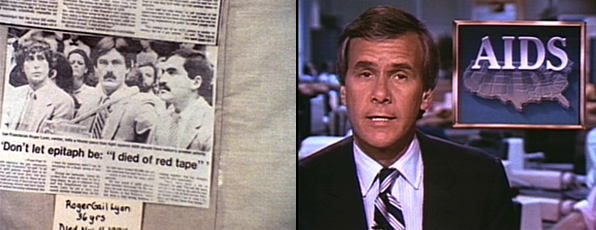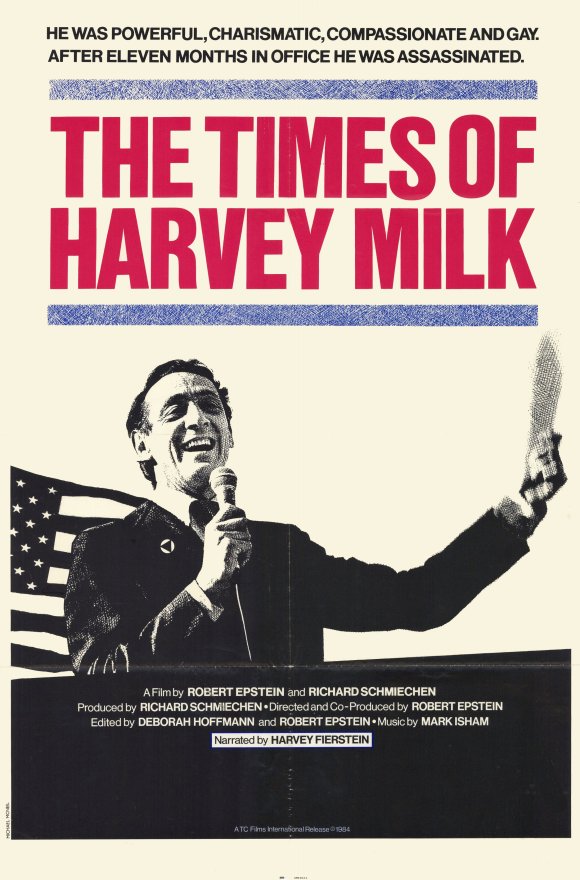Today is Wear It Purple Day, which asks people to simply wear the color purple in support of LGBT equality. It's appropriate then that we continue our celebration of 1989 today with a look at that year's Oscar winner for Best Documentary. Glenn is joined in a conversation by friend of The Film Experience and doco-expert Daniel Walber, writer for Nonfics and Film School Rejects.
 Glenn: Daniel, thank you for joining us. While I would obviously love to hear your thoughts on the film, I think I would be just as interested to hear about how well you think Common Threads: Stories from the Quilt sits amongst Oscar's documentary history. So few films about gay issues have even been nominated, yet alone won (the only other winner of its kind is The Times of Harvey Milk, also by Rob Epstein), but does Common Threads hold up as a winner? And furthermore, given just one year later they ignored Paris is Burning, does it strike you as just a case of voters simply going for a subject matter that they felt was Important and Worthy rather than any genuine interest in LGBT issues?
Glenn: Daniel, thank you for joining us. While I would obviously love to hear your thoughts on the film, I think I would be just as interested to hear about how well you think Common Threads: Stories from the Quilt sits amongst Oscar's documentary history. So few films about gay issues have even been nominated, yet alone won (the only other winner of its kind is The Times of Harvey Milk, also by Rob Epstein), but does Common Threads hold up as a winner? And furthermore, given just one year later they ignored Paris is Burning, does it strike you as just a case of voters simply going for a subject matter that they felt was Important and Worthy rather than any genuine interest in LGBT issues?
Daniel: That's a fascinating question. I'm not sure a movie with the precise scope and loose style of Paris Is Burning would have appealed to the Academy no matter what it was about. They didn't go for Grey Gardens either. Common Threads was definitely helped by the gravity and capital-I Importance of its subject, but I also think it holds up well as a film. Epstein knows what he’s doing, and this one has just as powerful an emotional arc as Harvey Milk. The device of zooming in on panels of the quilt to introduce stories feels a tad schlocky at first, particularly with the Bobby McFerrin music underneath, but it wasn’t long before I was won over by its genuine affection and understanding for its subjects. Perhaps there’s some consternation that it beat For All Mankind [for the Oscar], which I know still has a great reputation (I haven’t seen it), but I do think Common Threads deserved the attention.
How to Survive a Plague, The Celluloid Closet and Film vs TV after the jump.
(Daniel cont.): If I have one big question it’s probably this: the film has to balance mourning and urgency, and an urgency that everyone in Hollywood would have instantly understood in 1989. Does it still feel like a film made during an epidemic, with a fresh and immediate political message, or have the intervening 25 years made it into more of a quiet eulogy?
Glenn: I definitely think watching the film in 2014 it becomes more of a eulogy. The entire film is incredibly powerful, but I found the final scene particularly moving as large sections of the quilt are systematically unfolded as the names of AIDS victims are read aloud against the backdrop of the White House. Curious that 25 years ago a film about this subject was ending with an uplifting message of hope given how prevalent the disease still was and how much of a stigma was still attached to it. The figures will never not be shocking, but I guess it's appropriate that a film about the AIDS quilt was as comforting as it was.
The next question I’d like to ask is this: was Common Threads the film the AIDS and LGBT rights movements needed in 1989? I think today there is certainly room for all kinds of documentaries – another recent documentary, All The Way Through Evening, about a generation of gay musicians lost to the disease is fabulous – but is it even possible to consider for a moment if a film of How to Survive a Plague's brute force had come out in ’89 what may have eventuated? The anger that courses through that 2012 Oscar nominee’s veins is nowhere to be found in Common Threads, what with its earnest music score and level-headed talking head discussion. I guess it’s pointless to contemplate, but I think it’s an interesting idea.
Daniel: I suppose this ends up being a question about what the role of a documentary can and should be. How to Survive a Plague reminds us of the reasons to be angry, the heroism of Act Up and the arc of a struggle in which there have been victories, if not a real end or cure. The newer film pulses with fury, in part, to educate an entire generation that is now growing up without any first-hand knowledge of the height of the epidemic. I think Common Threads probably, and reasonably, assumes that everyone who knew about AIDS by 1989 was already outraged. Epstein seems more interested with creating as open a film as possible, which is why he makes sure to include narratives of HIV contracted through drug use and contaminated blood treatments for hemophiliacs.

That is not to say that the film tries to divorce the AIDS crisis from the gay community - I think it's actually quite beautiful how Epstein explores the way that the family members of straight victims found a community in the LGBT organizations fighting the disease and organizing the AIDS Quilt. Watching Common Threads makes one angry simply by accurately reporting facts and empathetically showing the stories of those affected. It doesn't need to be explicitly angry to help its audience understand how furious they should be with the federal government over its negligence. The film is activist enough in showing the way that these people became activists to respond to the crisis, fired up enough to show the hatred of the fundamentalist Moral Majority without letting them derail its mission as a memorial.
Beyond that, how do you think it compares to Epstein's two other major films, The Times of Harvey Milk and The Celluloid Closet? They're something of an essential trilogy on gay life in America.
 Glenn: I find it hard to separate the titles you mentioned, that unofficial trilogy that surely make such a deep impact on anybody, young or old, who watches them. I think Rob Epstein is a remarkably vital and essential name in the history of gay cinema, and one who probably doesn't get enough recognition as he ought to (like documentaries that aren't Paris is Burning in general, I suppose). Certainly not as much as the names that came about towards the end of the 1980s and early '90s, which helped form "New Queer Cinema". I would also include Epstein's 1977 debut, Word is Out, which is another fabulous look at gay culture pre-AIDS that makes a lovely companion with Common Threads as a demonstration of how much change occured in one decade.
Glenn: I find it hard to separate the titles you mentioned, that unofficial trilogy that surely make such a deep impact on anybody, young or old, who watches them. I think Rob Epstein is a remarkably vital and essential name in the history of gay cinema, and one who probably doesn't get enough recognition as he ought to (like documentaries that aren't Paris is Burning in general, I suppose). Certainly not as much as the names that came about towards the end of the 1980s and early '90s, which helped form "New Queer Cinema". I would also include Epstein's 1977 debut, Word is Out, which is another fabulous look at gay culture pre-AIDS that makes a lovely companion with Common Threads as a demonstration of how much change occured in one decade.
To wrap up, I'd like to ask if there are any last words you have about Common Threads, or 1989 documentaries in general. Would you agree we're living in a golden age of the doc artform, and if so are there any - wait for it - threads that you can see from Epstein's era and the modern day?
Daniel: Another tough question! I don't know if we're living in a Golden Age of the documentary, exactly. That's the sort of thing that doesn't take on meaning until much later, if at all. There are certainly many more documentaries these days. The fact that there seem to be more great ones is part of that. If Epstein's work in the 1980s has any influence I think it might be more spiritual and social than formal; with Common Threads and with Harvey Milk, he was telling the stories of LGBT people with depth and honor, back when that was a much harder sell.
Finally, as far as legacy and continuity is concerned, we should remember that this is another Oscar documentary that was made for HBO. The Academy has spent years trying to figure out how to separate theatrical and television documentaries, and there certain isn't the time to debate that now. What does seem worth noting, though, is the cable network's continued support of documentaries on LGBT subjects. Political filmmaking doesn't seem to reach the public consciousness all that often in this country, but when it does it often comes in the form of television documentary. If there is something formally or thematically new about this "Golden Age," it's something entirely different from the consistent tradition of issue-oriented films financed by cable TV networks. Common Threads is part of a tradition that continues today.

Related Viewing: Paris is Burning (Netflix Instant), The Celluloid Closet (Amazon Instant), How to Survive a Plague (Amazon Instant, Netflix Instant); Common Threads and The Life and Times of Harvey Milk are available for disc rental on Netflix or purchase on Amazon.